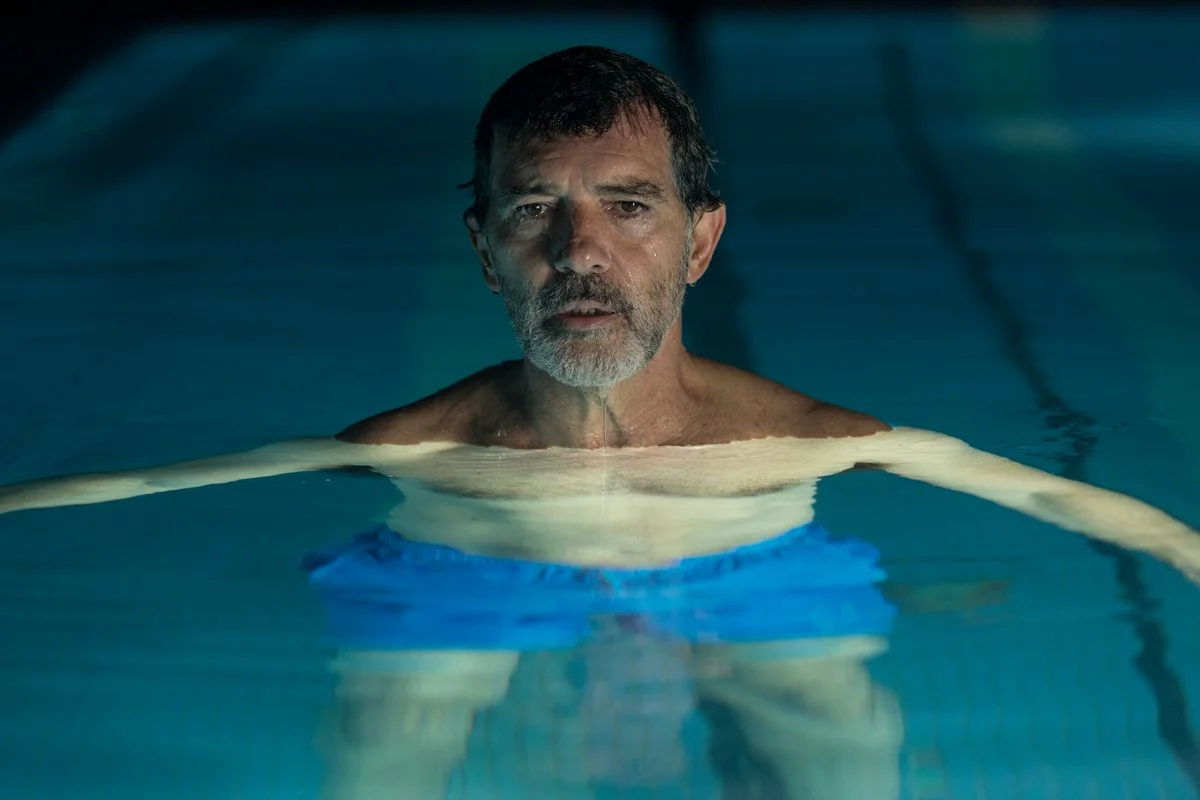Dolor Y Gloria (2019)
REVIEW BY: ROBERT CHANDLER
Pedro Almodóvar's DOLOR Y GLORIA is slow and contemplative and beautiful. Things happen which, in other Almodóvar films might have led to flights of fancy or colourful exploration, but here, in this reflective film about Almodóvar's own life and childhood, are allowed to go unremarked upon in pursuit of something greater... essentially the sadness and the majesty of life.
The film runs two timelines - a back and forth from the past (the Director as a boy, growing poor, up, living in a cave-house with his Mother and mostly absent Father) to the present (the Director a hypochondriac, wealthy, respected, sad, suffering a director's block, living in an arty, colourful apartment in Madrid); with another timeline intersecting in the form of a spoken-word play based on a text written by the Director about his first love. There's also a colourful graphic sequence, which felt incongruous and perhaps unnecessary, telling the story of the Director's hypochondria.
Not everybody will like the film, some Almodovar fans may find it frustrating or dull... yet it is not dull, it is rich and layered, and seeks a truth. The episodes (stories, moments) matter, and connections are made across time which are everything, for they are the threads a storyteller needs in his life to assure him God is there. In one scene, a small wooden egg used by the Director's Mother to darn her son's sock one night in a train station acquires a significance and potency akin to that of a religious icon. It's a beautiful object, a beautiful connection, and no accident that the egg is symbolic of life, a gift given to a son by a mother.
Antonio Banderas is excellent as the Director, the Almodóvar proxy. His performance is subdued and open, honest. That face. It's as though he has rejected everything he ever learned about acting and begun again afresh. No tricks. No performance. Just being the character, trusting the screenplay and his director. (Of course, A and B have worked together many times before and I suspect this allowed Banderas to strip himself down so much.)
Penélope Cruz gives what might be a career best albeit in a supporting role as the boy's Mother. She lights up the film whenever she appears. That's a cliché... It's not just light, its gravity, too. She commands the cinema screen and gives it back grace and honesty. All that glamour magazine beauty photography of Penelope can go hang... those images do not approach who she really is... but her films do; watch her act instead. Watch her in this film. Watch the opening scene, where the Mother and her Boy, alongside three other mothers, are washing clothes in a river and then draping them to dry on the riverside bushes. The moment is so beautiful and full of sunlight that when the women start singing the film approaches a state of cinematic rapture. This scene, which is never followed up within the narrative, reflects on the Director's assertion in the film that the cinema saved his life, and *is* his life; and here it is, in this opening scene, containing all of life and God and light and beauty, and his Mother.
The Director says when he was growing up he used to watch movies projected onto a whitewashed wall and dream of saving the heroines (we see Marilyn Monroe in NIAGARA and Natalie Wood in SPLENDOR IN THE GRASS). This is what Almodóvar attempts to do in honouring his Mother in the river washing scene and the Mother/Boy scenes that follow. The Mother is portrayed with honesty and affection, but Almodóvar and the Director also have to deal with a sense of regret for all the time they can never get back, and the film wonders how much of that time can or ought to have been given to loved ones, to his Mother. Which leads to the dolor of the title... for how can we ever give back enough?
It's no accident that a film poster glimpsed on the wall of the Director's assistant's office is Fellini's 8 1/2. There's a triangle that can be drawn between DOLOR Y GLORIA and 8 1/2 and Alfonso Cuarón's ROMA.
Watch them together! Astonishing cinema.
In the words of Faithless, "This is my church / This is where I heal my hurts."

